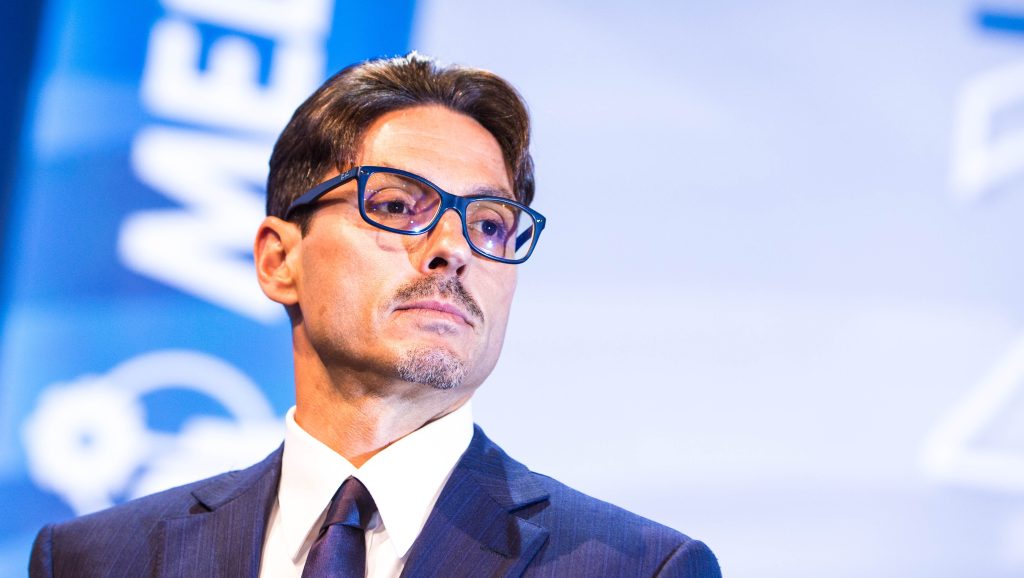Germany’s Minister for State and Culture and Media has urged MediaForEurope boss Pier Silvio Berlusconi to keep “promises” about ProSiebenSat.1 Media‘s future.
Wolfram Weimer made the direct address to Berlusconi at the Munich Media Days event yesterday after MFE replaced ProSieben CEO Bert Habets with MFE CFO Marco Giordani earlier this week. The minister said Bavaria’s Minister-President Markus Söder was “paying special attention” to the situation as a keen supporter of media independence.
Weimer and Berlusconi had discussions about the future of German broadcaster ProSieben after MFE gained 75.61% of voting shares last month, as the Italy-based media group formed Europe’s biggest broadcasting group through the deal.
ProSieben, which operates in Germany, Austria and Switzerland, now sits in a group also comprising Italy’s Mediaset and Spain’s Mediaset España, with a stake in Portugal’s Impresa also being sought. Germany’s government has a much more local eye on the situation, however.
“Dear Mr. Berlusconi, we had intense and ultimately positive discussions both at the Chancellery in Berlin and, in particular, here in Munich with our Minister President Söder,” said Weimer in a speech. “Perhaps, dear Mr. Berlusconi, you don’t know our Söder very well yet, but you should know that he is a real lion, and he pays special attention to strong media because he really fights for it.
“That’s why it’s good that you have promised us to really strengthen ProSieben’s Munich location. We will be keeping an eye on this. We are sure that you will keep your promises and want to see the Bavarian Media Authority and our lion happy. This is smart and good for ProSieben, but it is also important for Munich as a media location and for Germany as a whole.”
In a separate talk at the Munich Media Days, Söder welcomed the new bosses at ProSiebenSat.1, but warned against the lack of German investors.
“The truth is that ProSiebenSat.1 has not been as successful in recent years as it could have been,” he said. “In this respect, it’s like in football: There is a change of coaches from time to time, and we now have to make sure that the development is positive, because the location is a strong media location, and media includes traditional media, but also everything around it, because today we are not only in the traditional media sector, but also in AI and digitalization.“
Söder is demanding ProSieben remains headquartered in Bavaria, which is in the southeast of Germany and around 400 miles from the capital, Berlin.
German journalism unions have voiced concerns over the editorial direction of ProSieben under MFE, which led to Berlusconi providing assurances to senior government ministers that independence would remain. Berlusconi’s late father, Mediaset founder Silvio Berlusconi, was known for strong views on the editorial and political lines of his Italian networks.
Senior sources at ProSieben have told Deadline there has been no obvious interference in Germany to date, but Habets unexpected exit has led to more questions. The former CEO had been due to speak at the Munich Media Days, which is running this week.
ProSieben COO Markus Breitenecker and CFO Martin Mildner were also announced as exiting this week, as Giordani was sworn in as CEO of ProSieben. ProSieben chair Maria Kryiacou said said the new structure, which includes Bob Rajan coming in as interim CFO, “reflects the ambition to further accelerate the strategic transformation with a clear focus on excellence and a leading market position in entertainment.”
Streamers meetings
Elsewhere in Weimer’s speech, he said that several recent meetings with global streamers would “vey soon” result in an announcement around a “restructuring of the production landscape.” This would “give the struggling market a boost,” he added.
No details on the scope of shape of the talks were forthcoming, but it is known Germany’s production sector has long been seeking an agreement with streamers that better compensates producers, writers, directors and other creatives in film and TV.
Weimer and other members of Germany’s government have been working on plans to introduce investment obligations on streamers, as part of plans to boost the number of films and TV shows made in the country.
Some €250M ($290M) will be made available next year to encourage more filming, meaning that along with regional funds and other pots, around €310M will be on offer overall. This does not include production subsidies from federal states.
Weimer has previously said government intervention is needed due to the “imbalance” caused by global streamers.
For streamers, the issue of local investment is becoming more and more pressing, with most countries now working on some form of levy or quota that matches, at least in part, the content obligations placed on local broadcasters.

